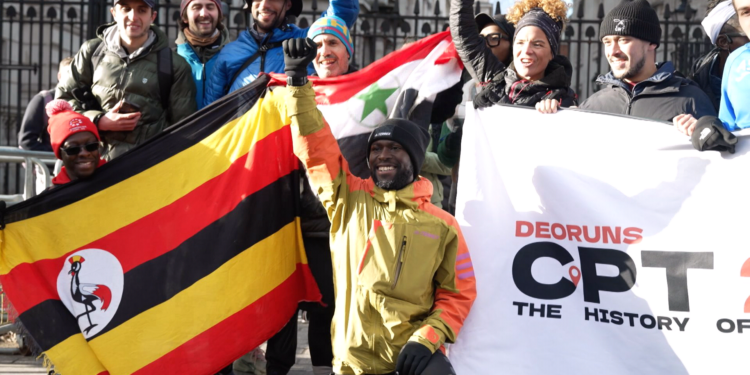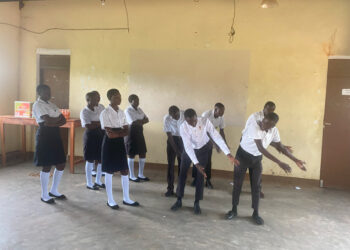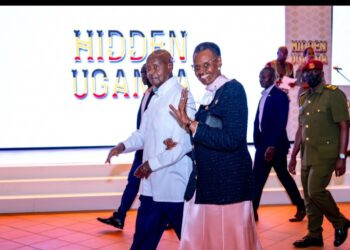A remarkable journey has come to an end this weekend as Deo Kato, a British-Ugandan athlete, arrived in London after running over 7,700 miles from Cape Town, South Africa, in a quest to raise global awareness about racism. The 518-day odyssey saw Kato endure extreme physical challenges, including war zones, imprisonment, and harsh illnesses. Yet despite facing these hardships, he remained determined to push forward in the hope of confronting the ongoing discrimination faced by many, particularly black Africans, in both Africa and Europe.
Kato set off from the Long March to Freedom monument in Cape Town in July 2023, with a powerful goal in mind: to raise awareness about the discrimination experienced by people of African descent and highlight the long history of human migration, which has often been marked by prejudice and racism. His route took him through 12 countries, covering a staggering distance of 8,230 miles, and encountering numerous obstacles along the way.
While the journey tested Kato both mentally and physically, it was also a deeply transformative experience. Reflecting on the highs and lows of his run, he shared that the deep emotional and physical struggles were counterbalanced by some inspiring moments. In Botswana, for example, he was joined by a 15-year-old boy who spoke multiple languages, including English. The boy had lived in England but returned to Botswana due to family challenges. Their brief run together reminded Kato of his own teenage years, a memory that warmed his heart and renewed his sense of purpose.
Another uplifting moment occurred in Kenya, where a group of children spontaneously joined Kato for a 5-mile stretch as they headed to school. The children’s enthusiasm and joy in running alongside him gave Kato a much-needed boost. “They wanted to continue running with me,” he said, reflecting on how small acts of solidarity like this reaffirmed his belief in humanity.
However, the journey was far from easy. In Uganda, Kato faced an unexpected setback when his one-man support crew resigned, leaving him without logistical help just as his funding for the run was dwindling. He also faced logistical challenges due to ongoing conflicts across parts of Africa, including the eastern Democratic Republic of the Congo, Sudan, and northern Ethiopia, which made the future of the run uncertain.
But the true test came after Kato entered Europe. In Croatia, he endured racist abuse, being stopped by the police up to four times a day and feeling like an illegal immigrant, despite his mission to raise awareness.
Locals sometimes took photos of him and reported him to the authorities. Kato said that this experience, combined with the challenges he had already faced in Africa, made him question whether he should continue. “I didn’t feel welcomed or that I belonged in their society,” he recalled, highlighting the deeply ingrained racial prejudice that still permeates many societies.
Throughout the ordeal, Kato’s overarching message remained clear: the run was not just about the physical feat, but about challenging racist attitudes and pushing back against the belief that people should “go back to where they come from.” By tracing humanity’s ancient migration paths, Kato sought to remind people of the essential role migration has played in shaping societies and cultures.
“The run was meant to underline the positive aspects of migration,” Kato said, adding that he hopes it will lead to a more culturally connected and enriched global society. Despite the setbacks and moments of doubt, Kato remains hopeful about the future.
“I think that in the future, we will create a world free from racial discrimination,” he said, acknowledging that while such a world may not exist in his lifetime, the efforts of people like him are laying the groundwork for future generations.
Kato’s reflections also brought attention to the growing issue of anti-migrant sentiment in Europe. He was especially critical of the European Union’s approach to immigration, which he argued is designed to restrict and criminalize migrants from the global south, especially Africans.
“The global north has long-established systems deliberately designed to restrict and criminalize individuals from the global south,” Kato said, voicing concerns that Europe’s “fortress” mentality towards migration continues to reinforce racial divisions.
Kato’s partner, Alice Light, has been with him throughout the ordeal, offering support from afar. Reflecting on the journey, Light said it has been a rollercoaster of highs and lows, a blend of joy, beauty, and heartbreak. “I feel immensely proud and blessed to have been on this journey with Deo,” she said, expressing her gratitude for the experience. She also shared that they have no specific plans for Christmas, given the unpredictable nature of their journey, but are simply looking forward to a well-earned rest.
As Kato reached the final stretch of his route, he was met by hundreds of supporters and fellow runners outside Downing Street in central London. They joined him in celebrating his achievement before he completed his run in Hammersmith, west London, marking the end of an extraordinary journey that will undoubtedly inspire many for years to come.
Kato’s journey stands as a testament to the power of resilience and the ability of one individual to spark global conversations about the deeply rooted issues of racism and migration. His run from South Africa to London was not just a personal challenge, but a call to action for a more inclusive and just world.
Do you have a story in your community or an opinion to share with us: Email us at editorial@watchdoguganda.com













